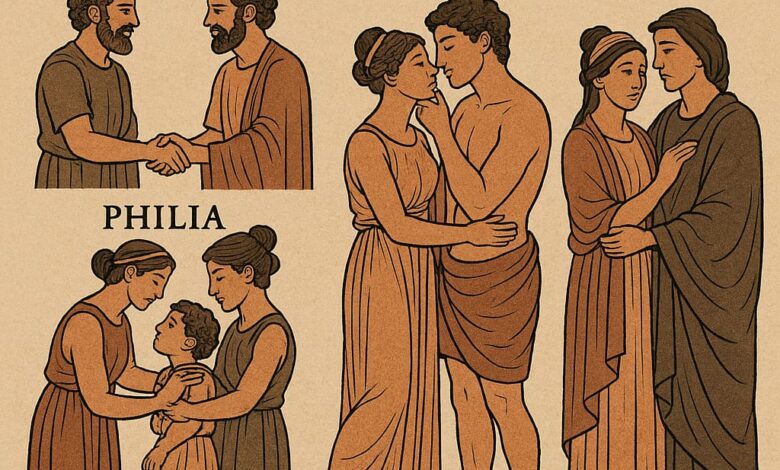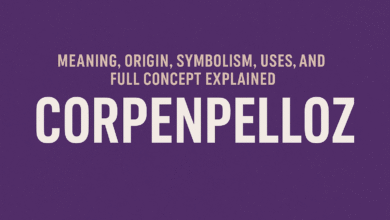Greek Forms of Love: Understanding the Ancient Philosophy of Emotional Bonds
greek forms of love

Love is a universal human experience, but its meaning varies greatly across cultures and individuals. While modern society often reduces love to romantic feelings or infatuation, the Ancient Greeks took a more nuanced and philosophical approach. They believed that love wasn’t a singular emotion but rather a collection of distinct experiences and expressions. This belief led to the development of what we now call the Greek forms of love.
In this article, we’ll explore the forms of love in Greek, including the three forms of love in Greek philosophy most commonly referenced, and extend into all eight classical and modernly acknowledged forms. This journey through ancient wisdom can help us better understand our own relationships, both with others and ourselves.
The Origins of the Greek Forms of Love
The ancient Greek thinkers—Plato, Aristotle, Socrates, and others—were deeply interested in understanding human nature. They observed that people experience different kinds of love in different relationships: romantic partners, friends, family, and even toward the divine or humanity. Thus, they defined multiple “loves,” each carrying a distinct essence and function in society.
These concepts were not just poetic; they were practical tools for moral development, emotional intelligence, and interpersonal harmony.
The Three Forms of Love in Greek (Classical Core)
Though many scholars today talk about eight Greek forms of love, three have long stood as the foundation in philosophical discussions:
1. Eros (ἔρως) – Passionate and Romantic Love
- Definition: Eros represents intense desire and attraction, particularly sexual or romantic in nature.
- Named After: The Greek god Eros (equivalent to the Roman Cupid).
- Nature: This love is fiery, impulsive, and intense.
- Modern View: Think of “falling in love” or love at first sight.
Eros is vital in romantic relationships but is also seen as unpredictable and often unsustainable if not supported by deeper bonds.
2. Philia (φιλία) – Affectionate Friendship Love
- Definition: Philia is a noble form of love found in deep friendships. It’s based on shared values, loyalty, and mutual respect.
- Philosophical Roots: Aristotle considered Philia essential to human flourishing.
- Modern View: Best friends, comrades, or even business partners who truly care for each other.
Philia involves giving and receiving without selfish motives, which is why it was celebrated as the highest form of love in philosophical discussions.
3. Agape (ἀγάπη) – Selfless, Unconditional Love
- Definition: Agape is universal love—compassionate, altruistic, and self-giving.
- Spiritual Origin: Prominent in Christian theology as the love of God for man and vice versa.
- Modern View: Love for strangers, charitable acts, and unconditional parental love.
Agape stands above other loves in its ability to transform societies and heal relationships. It asks nothing in return, which makes it rare and powerful.
Beyond the Three: The Eight Greek Forms of Love
While the three forms of love in Greek philosophy—Eros, Philia, and Agape—form the core, scholars and modern psychologists now recognize additional types to reflect the full human emotional spectrum.
Here are the eight recognized Greek forms of love, including the core three:
1. Eros – Passionate/Romantic Love
As noted earlier, Eros is the kind of love that involves:
- Desire and attraction
- Infatuation and intimacy
- Physical expression
But Eros can also lead to problems if not grounded in reality. When love is purely physical, it can fade or become possessive.
2. Philia – Deep Friendship
Philia is the love you feel:
- For lifelong friends
- Between teammates or comrades
- In mentor-mentee bonds
This love thrives on trust, sacrifice, and mutual respect. It is what Aristotle called “virtuous friendship.”
3. Agape – Unconditional Love
Agape is often:
- Altruistic
- Spiritual
- Sacrificial
Agape inspires actions like:
- Volunteering
- Forgiveness
- Loving someone without expectation
It’s the love that transcends ego and benefits others selflessly.
4. Storge (στοργή) – Familial Love
- Definition: Storge is natural affection, especially between parents and children.
- Instinctive Love: This love doesn’t have to be earned—it is unconditional and often taken for granted.
- Modern Use: Sibling bonds, caregiver relationships, and deep-rooted affection between relatives.
Storge develops slowly but is incredibly strong.
5. Ludus (Λούδος) – Playful Love
- Definition: Ludus is casual, flirtatious love with no strings attached.
- Playfulness: Think of playful teasing, dancing, or light-hearted dating.
- Examples:
- Flirting at a party
- Childhood crushes
- Joking around with a romantic interest
Though not deep, Ludus is vital for building chemistry and fun in romantic relationships.
6. Pragma (πράγμα) – Enduring Love
- Definition: Pragma is mature, practical love, built on mutual goals and effort.
- Long-Term: This is the love between couples who’ve weathered storms and grown stronger.
- Examples:
- Married couples who adapt over time
- Business partnerships turned deep connections
Pragma is not about butterflies—it’s about choosing each other every day.
7. Philautia (φιλαυτία) – Self-Love
- Definition: Philautia is the love we have for ourselves, which can be healthy or toxic.
- Two Faces:
- Positive: Confidence, self-worth, boundaries
- Negative: Narcissism, arrogance
Modern self-care movements champion positive Philautia, while warning against ego-driven forms.
8. Mania (μανία) – Obsessive Love
- Definition: Mania is possessive, obsessive love, driven by insecurity or dependence.
- Dangers:
- Jealousy
- Control
- Emotional instability
This form of love often leads to toxic relationships, mental stress, and heartbreak. It’s the shadow side of Eros.
Forms of Love in Greek vs Modern Concepts of Love
| Greek Concept | Modern Parallel |
|---|---|
| Eros | Romantic crush, sexual attraction |
| Philia | Best friendships, deep companionship |
| Agape | Charity, spiritual or unconditional love |
| Storge | Parent-child relationships, close family |
| Ludus | Flirting, casual dating |
| Pragma | Mature love, long-term marriage |
| Philautia | Self-care or narcissism |
| Mania | Obsession, emotional dependence |
These distinctions offer more precision than the English word “love,” which can mean many things depending on context.
Why Knowing the Greek Forms of Love Matters Today
In an age of emotional confusion and relationship breakdowns, understanding the Greek forms of love can help us:
- Build better relationships by identifying what kind of love we are experiencing or lacking.
- Avoid toxic situations, especially where Mania or unbalanced Eros dominates.
- Foster personal growth by developing healthy Philautia and striving for Agape.
- Deepen intimacy with romantic partners by transforming Eros into Pragma and Philia.
These ancient ideas also influence modern psychology, especially in areas like:
- Attachment theory
- Emotional intelligence
- Love languages
Conclusion: Love as a Multifaceted Gift
The Greek forms of love remind us that love isn’t a single emotion, but a rich, diverse spectrum. From the passionate flames of Eros, to the steady comfort of Storge, the mutual trust of Philia, and the divine light of Agape, each form teaches us something profound about the human heart.
Whether you’re seeking love, giving it, or healing from its absence, turning to these ancient insights can offer guidance, clarity, and even peace.
Next time you say “I love you,” you might ask yourself—which kind of love do I mean?



